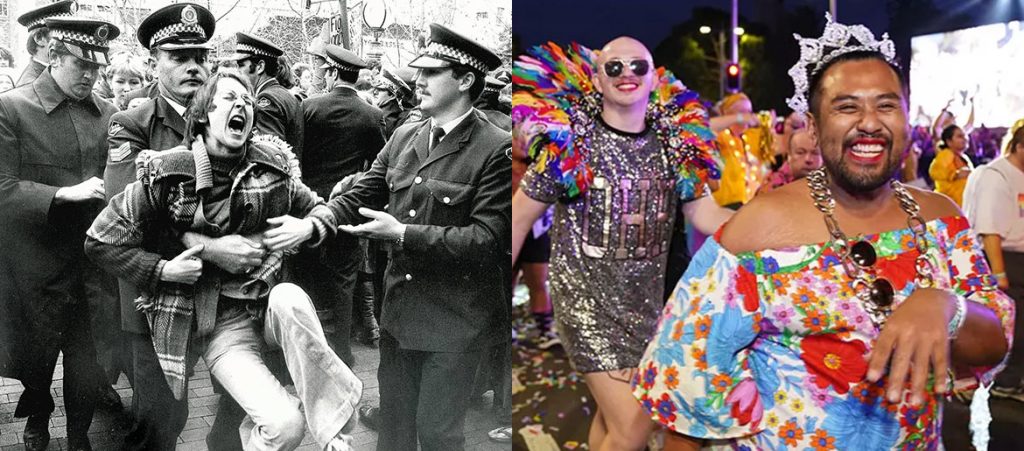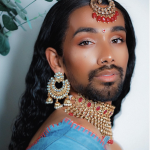
Queer activism today looks a whole lot different today than it did 50 years ago. We are lucky to be able to use technology and social media to raise awareness, advance LGBTQIA+ rights, and increase the representation and visibility of young queer people in all aspects of life. While Gen Z and Millennial creators and voices are taking advantage of this exciting new era of activism, we sometimes fail to acknowledge the original progress and sacrifices made by the queer trailblazers of previous generations. Here’s why honouring history – the blood, sweat and bricks that got us here today – is key to creating a more accepting world now and in the future.
Looking back is not only respectful but crucial
Dr Shirleene Robinson, President of Sydney’s Pride History Group, says recognising the work of past activists is a crucial component of driving progress in the 21st Century. “It’s really important that we acknowledge what they’ve sacrificed and recognise that the work they put in may have put a toll on people.” When original trailblazers, like David McDiarmid and Liz Ross, were fighting the good fight in the 60s and 70s, Dr Shirleene reminds us the threat was existential. “Being openly homosexual was something that could result in being fired from your jobs, it could result in severe discrimination and being arrested. There were very heavy costs — people even experienced forced medical treatment for their homosexuality.”
Some of these repercussions are less prevalent today (though not completely eradicated), but activism still involves intense physical, emotional and economic consequences. If we have any hope of continuing our progress it is not only respectful to acknowledge the work of older activists, but imperative to the longevity of the movement.
“[Looking to the past] can give us the ideas of strategies that have worked. What were the things that were effective, how did they manage to achieve so much in that particular time period?” Dr Shirleene says.
Tensions between past and present
But looking to the past can sometimes be confronting, especially when the goals of our future can differ. Paris Balla is a Gen Z, queer theatre maker currently undertaking a PhD in activism theory. They say one of the key differences between ‘new age’ and historical queer activism is how much more global our efforts and networks can be now. “We have access to information and communication instantly with the use of our phones and social media. We’re able to educate and inform people about the challenges that queer people are experiencing in much more intimate ways than ever before. I can see videos from queer women in Ukraine and follow trans women of colour in America and get to learn their stories as they are unfolding. Marginalised people are able to have platforms to speak in a way that simply wasn’t possible before the internet existed in its current form.”
But this access can also bring a lot of noise. Differing opinions on goals and etiquette can derail conversations and action. It’s easy to form an opinion after watching a three-minute video on social media without understanding the context of how we got here in the first place.
Paris uses the example of online identity and label discourse: “Discourse on identity and labels is something that has changed over time, so rather than going on the defence if we hear about an older trans man who identified as a lesbian for his whole life and doesn’t want to let go of that label and community, we should be understanding.” If a young queer person doesn’t learn about our history to understand the devastation and years of abuse that our people have endured for us to be able to be where we are, it can be borderline reckless. Fighting within the queer community only hinders our ability to move forward in our society at large.
It’s not just on creators
While individual creators and activists have a responsibility to give credit to those who came before them, as consumers we have a role to play in this too. We are just as complicit in ignoring the lessons from the past, and rainbow-washing our future. When a brand slaps a rainbow on a product and or an influencer pushes out a Canva template with the words “Yass Queen” on it, it does not automatically make them an ally. Yet we eat this performance up, turning a blind eye to the fact that these brands only talk about LGBTIQA+ rights during Pride month and rarely acknowledge queer history. In 2021, independent newsletter Popular Information looked at 25 American corporations (including the likes of Walmart and Deloitte) that changed their public avatars to include the Pride flag during Pride month. Those corporations had collectively given more than US$10 million to support the campaigns of politicians with anti-gay policies and beliefs over the previous two years. It’s not just icky, but causes direct and real harm to the LGBTIQA+ community. Having an understanding of the history and sacrifice of the original activists would make us more effective as seeing through the rainbow haze.
Bringing queer history to the forefront of this next generation of activism leads to more thoughtful moments of engagement within the broader community. A great example of the intersection between history and technology is Meta’s partnership with the Pride History Group to create the Walk With Pride augmented reality (AR) filter on Instagram. By activating the filter at six important sites in Sydney, users will see images and quotes come alive to explain how these locations have shaped pivotal moments in Australia’s LGBTQIA+ history. Dr Shirleene, who was part of the team who worked on the filter, explains that illuminating the rich history of LGBTQIA+ activism in Sydney actively helps to advance the cause. “There is a vital link between LGBTQIA+ inclusion, recognition and connection and our history. The community has an incredibly rich history full of sacrifice and determination to make our society a better and fairer place for everyone.”
Taking our history forward
Although we are now arguably able to accomplish progress at a larger scale and at a quicker rate, it is a privilege to be able to do so. “The trailblazers who fought, brick in hand, for the rights that we have today had to risk so much more than I ever will. I am protected by laws and a society that for the most part condemns actively discriminatory behaviour. I am white so I’m not going to go to jail for speaking out against injustice. I am not going to be arrested for wearing men’s clothing, I’m allowed to marry a woman, to adopt, to take hormones to affirm my gender. As a Gen Z queer, the rights that I have would be difficult for trailblazers to believe,” says Paris.
There is simply no denying that the LGBTIQA+ community would not be where they are today without original queer trailblazers making their voices heard. And those who sacrificed the most – trans people of colour, queers with disability, low-income and other intersecting identities – are the ones who must continue to fight for. Their voices deserve to be at the front of the conversation. “The history of queer activism and its future is intersectional and sometimes that means shutting up and listening to the voices of the people who are most marginalised within our community. Queer activism that focuses on marriage, family structures, representation and job opportunities is great, but if we still have siblings being murdered on the streets for just existing then how much have we actually moved forward?” asks Paris.
Dr Shirleene agrees that there are people within the community still facing existential threats that need more airtime. “There is a considerable amount of work to be done in terms of recognizing the rights of intersex people, and for intersex infants to avoid unnecessary surgery. There are some very real issues that need to be addressed and it’s important that we draw on the solidarity of our movement for that.”
This article isn’t meant to yell at young people for not doing a ‘good enough’ job at our activism, rather it is a reminder that we are not alone in this fight. Looking back to the past will not only help us move forward, it is the key to our progress. “At the heart of both [generations of activists] there is an urge to really try and change the world to make the world a better place for LGBTQIA+ people. And I think that an awareness of what’s happened previously, can really inspire and uplift Gen Z activists,” Dr Shirleen says. “Social change happens because of the work of a lot of different people, and any kind of appreciation and awareness of those people, of what drove them and what they were able to achieve, can help us to keep moving along that path and continue their incredible work.”




Comments are closed.